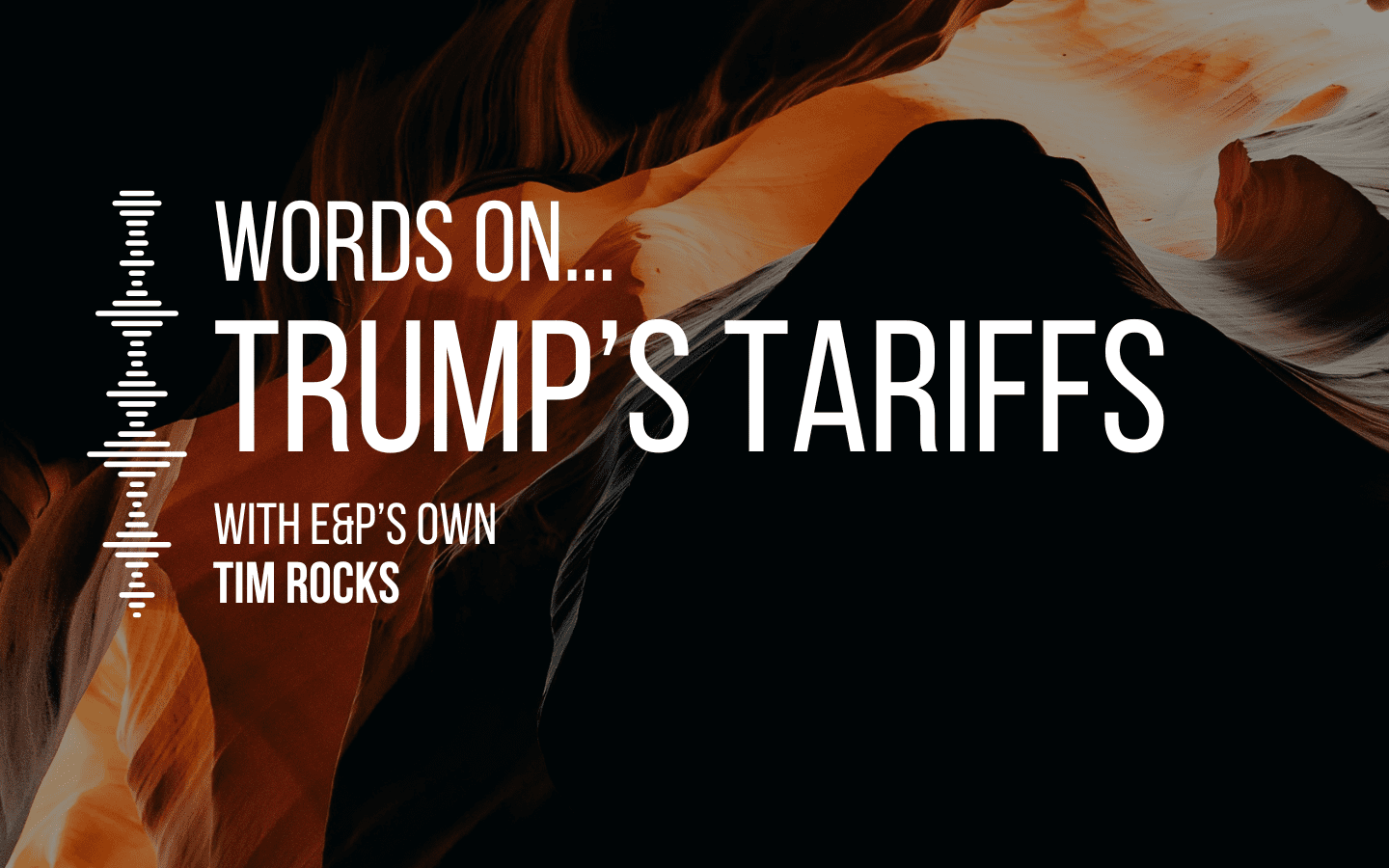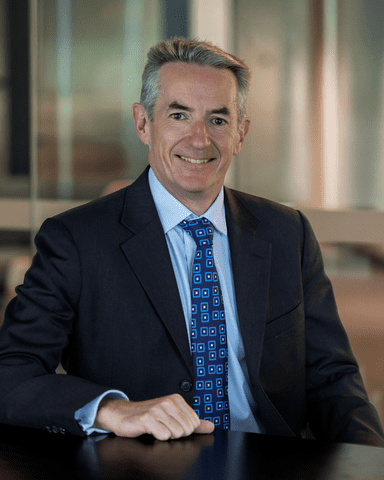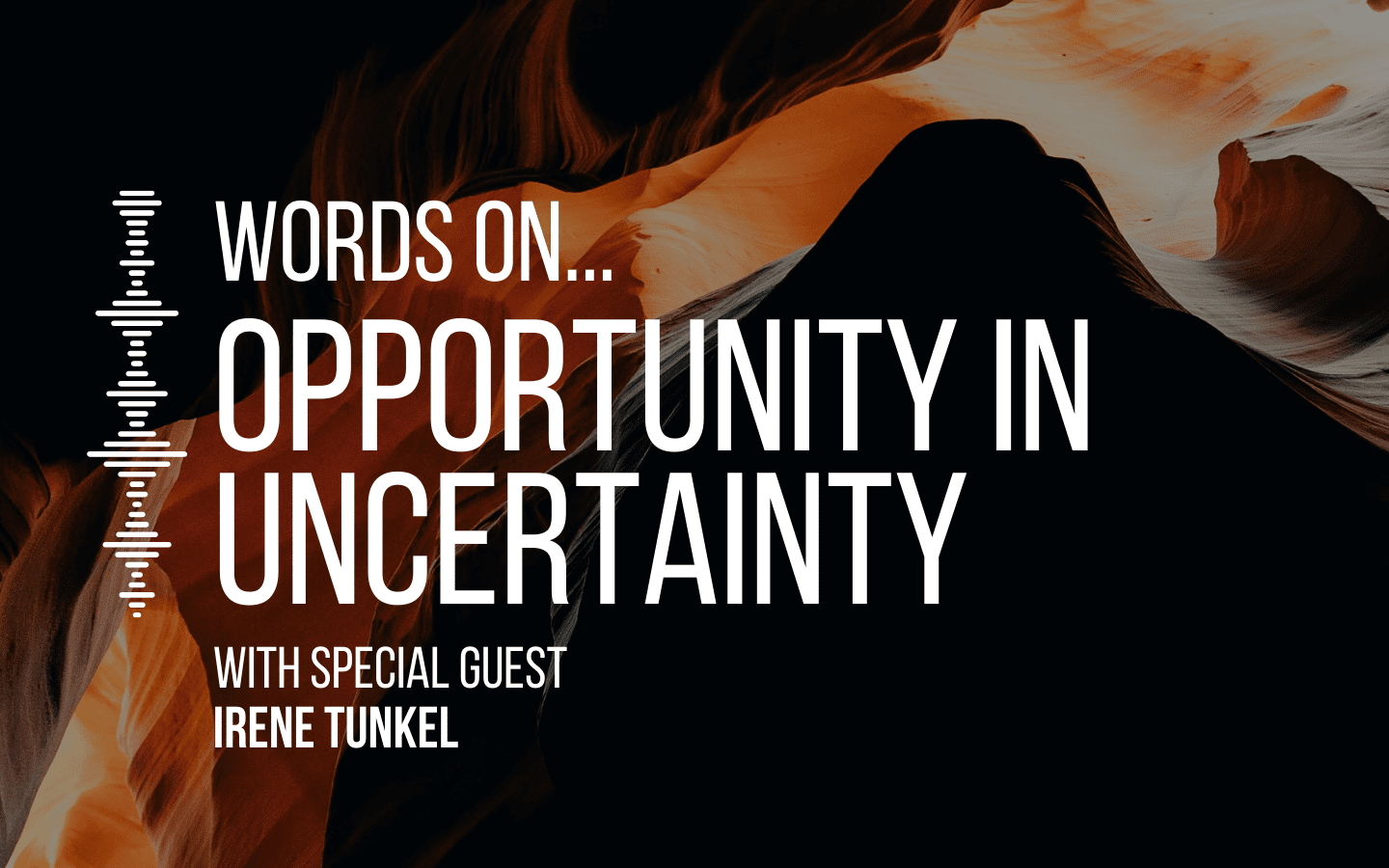


In this latest episode of Words on Wealth, host Tim Rocks speaks with David Blood, Senior Partner of Generation Investment Management and former CEO of Goldman Sachs Asset Management, about the current market environment and the future of sustainable investing. They explore the evolution of ESG, the resilience of climate-focused strategies amid current political pushback, and how long-term capital allocation can drive real impact in a shifting global economy.
Want to find out more? See here for the Senior Partner Letter recently written by David Blood.
This episode is also available on Apple Podcast.
Tim Rocks
Hello and welcome to Words on Wealth. I am Tim Rocks, Chief Investment Officer and I’m delighted today to be joined by David Blood from Generation Investment Management. He is the senior partner and one of the founders of that firm that I believe was started 21 years ago, along with Al Gore as part of his climate change initiative. So we might sort of talk a little bit about that later, but we might start with some recent development, shall we say, on the climate change and broader DEI front, as you call it in the US. Do you want to give us some comments, David, about recent developments maybe in the market and in Trump world and how that sort of affected your kind of thoughts on the investment environment generally. I should mention as well that David Blood was, you ran Goldman Sachs Asset Management, a long-term market participant and with many scars to prove it, I’d say.
David Blood
Yes. Well, Tim, thank you very much for having us. And we’re talking on the morning of April 10th. And I think all of us who’ve been in markets for a long while will remember this morning more so than many others to see the markets respond in the way that they have. think this in the United States, was the most significant positive day since 2008 actually. So it was a huge move overnight and off the back of significant volatility over the last week or so since Liberation Day. And as I said, I think all of us who’ve been in markets for a while will remember this. But I think it’s also important to remember sort of the core fundamentals of long-term investing and how to think about managing volatility. In my career, I think there’s probably been 10 to 12 of these kind of days. Starting in 1987 was the biggest one. I would say in my early career.
Tim Rocks
It was a 20 % fall, wasn’t it?
David Blood
Yeah, that was quite a day, I would say. Actually, when I started in the investing world, it was 1981 and the prime rate was 22.5%. It’s gone from 22.5% to almost zero and now a little bit higher. And I’d like to say to folks that even people like me could make money in that sort of environment when you’re going from interest rates that high to zero has been quite a tailwind in these 40 plus years. But there’s been the volatility. And what we have always thought about in generation is what are the core fundamentals of investing? think that is long-term investing is best practice. We believe that sustainability factors like the environment, like biodiversity loss, like health, like sustainable development, like governance are relevant to economies and relevant to businesses and therefore must be included in a long-term investing framework. And when we started 21 years ago the term ESG didn’t exist, environmental social governance factors, but we will use that for our purposes today to say that issues like governance, issues like how you attract and retain employees, issues like your environmental footprint do matter to business models and do matter to the assessment of management and if you are a quality manager such as Generation, using and understanding holistically how businesses operate, how management teams operate is a lens to help us make better capital allocation decisions.
Tim Rocks
So the best companies tend to be the ones that are most on top of sustainability issues broadly defined.
David Blood
Absolutely and so we, when we established the firm, we aspire to be outstanding investors. Our investment framework is about allocating capital in the very best way possible. We have never thought about trading values for values as being our purpose. Our purpose is to deliver strong risk-adjusted investment results and increasingly impact the strong risk-adjusted investment results and therefore the approach that we take, including sustainability, into a rigorous investment process we think is best practice. And the issue is, and we’ve been at it now for a long while, but the issue is that people still believe as soon as you say sustainability, they put you into a bucket where you’re not a serious investor. I think particularly in the early years, people thought we basically wore flip-flops and held hands and sang kumbaya as our principal investing strategy. We still do sing kumbaya before every meeting, it’s not really been how –
Tim Rocks
Probably even more so now.
David Blood
Yeah, we might need to this morning to channel – Exactly.
Tim Rocks
And has it been your experience that it’s basically worked that those sustainability principles have delivered better results than might otherwise have been the case? There hasn’t been a trade-off effectively?
David Blood
Yeah, so it’s very, very important that we demonstrate that. And I’ll talk about our second purpose here in a second. We had our 20th track, 20th anniversary of our track record on April 1st. In that period, we have had 17 years where we’ve outperformed and three years where we’ve underperformed. And that’s pretty good, as it turns out, in active management. Now, we would prefer to have no years where we’re underperforming, but that’s unrealistic. In fact, if anything, I would say we’ve been very blessed to have just three years of underperformance. But the point is, is that we’ve been able to demonstrate in our public market strategies and in fact in our private market strategies that sustainability is an excellent tool to deploy capital. And so again, it’s not trading values for value. It’s not imposing our values on the portfolio it’s actually an investment framework.
Tim Rocks
And where does the fund sit in terms of trying not to do bad versus being more impact and trying to do good?
David Blood
Yes, well so that’s actually quite an important question and let me just go back quickly to say that our mission is to deliver strong risk adjusted investment results and to promote sustainability in the capital markets and so we’re B Corp, we’re mission driven and we are a pure play sustainability manager. So that’s all we do. We don’t have a global equity strategy and then a sustainable global equity strategy. We just have one strategy. We don’t have two teams. Incidentally, we don’t have investment professionals and then sustainability experts. Everybody is one integrated approach. And what we’re, we are clearly trying to deliver a world that we think is aligned with a sustainable future. And that is absolutely our objective. In the public markets, it is harder to do that in a pure play. And so what we are looking for are businesses that we think are providing goods and services that are driving to a sustainable world. And in our private market strategies, we can be a bit more specific, if you will, because these tend to be smaller companies or companies that have decided that sustainability is critical to their business model and we’re able to deploy capital in that respect and therefore drive probably greater impact than maybe some of our public securities. But the public markets, there’s some amazing companies in the public markets that are driving to a more sustainable future and we’re very pleased to be part of those shareholder groups.
Tim Rocks
And with the attack on DEI that’s gone on in Trump world. Has that affected the sustainable finance? Is it harder for those companies to actually achieve their mission? So do you play more important role in this kind of environment?
David Blood
Well, there’s no question there’s a lot of noise. And Mr. Trump, President Trump has made it very clear that he is not a fan of DEI or EDIs as we would say or sustainability for that matter or climate change and he has issued a series of edicts that are doing everything possible to try to disrupt that and has done so in the United States to a certain degree. However, we don’t actually see that while it’s unpleasant and it’s oppressive in many ways, it is inconsistent with best practice business. So the business case for EDI, the business case for transitioning to a lower carbon economy or a no carbon economy is very robust, it’s very clear, it’s about driving to a better economy. And that is well known in the United States, frankly, and it’s certainly well known outside the United States. And what we’re seeing increasingly outside the United States is institutions, capital allocators actually being very clear that if we see you, American investment manager, pulling back from your commitments on sustainability, we will fire you. And in fact, it has happened where some of the largest capital allocators are firing the American firms because they’ve publicly pulled back from EDI or sustainability and they’re not having it. While the state attorney general of state of West Virginia might feel smug about causing certain firms to publicly pull back, I don’t think that that is where the world is. again, it’s not about us saying, it’s just more morally correct. It’s what is the business case for EDI? What is the business case for decarbonizing our economy? And that’s what’s driving this sort of change.
Tim Rocks
That’s very interesting. So effectively you’re saying that that push towards sustainability, addressing climate change issues is so entrenched now that it can withstand a four year assault from…
David Blood
Yeah. So we’ve been at this 21 years. This is the fourth time we’ve seen a pullback on sustainability and each time it comes back stronger, more robust and further down the road and we absolutely expect that that’ll be true again this time.
Tim Rocks
Yeah, So Al Gore of course is one of the founders of the firm along with you. I’m sure you don’t want to put words in his mouth but how does he think about where we are in the whole approach towards climate change? Are you kind of hopeful that we’re well along in the journey, that we are doing the right things? Do we need to do more?
David Blood
Well, the first thing that Al would say is that he is very sorry we didn’t call the firm Blood and Gore. He really thought that was going to be the right way to approach our business. Our other five founders didn’t think that was such a good plan.
Tim Rocks
Trump might take it for you. He’s a good bit of Blood and Gore.
David Blood
Yeah, other five founders I think are correct. We would clearly say we actually published a piece in the Wall Street Journal just a few weeks ago where we made it very clear we are not moving fast enough. And the pause around sustainability, while we think that we’re moving forward and the business case is very clear, but the fact is that any pause is unhelpful and frankly we weren’t doing enough a year ago. And so the pause now is not coming at a good time by any stretch of imagination. And that’s across the people, that’s across nature, and that’s across climate. We have to do much more than we’re currently doing. The task is going to be extremely hard. Absolutely, extremely hard. But if, as we say, if something is unsustainable and what we’re doing now is unsustainable, it eventually will stop. And so we’ll make this transition. The question is, will we make it fast enough to avoid the greatest implications of not moving? We actually think we will get there, because ultimately people do the right thing. The old expression is Americans ultimately do the right thing after they’ve exhausted every other opportunity or every other alternative. I think that’ll also be true here with climate.
Tim Rocks
And so what are the main things we could do, what are the next big things we could do to achieve that? And perhaps which countries need to do it? Is it the US or is it China, is it India?
David Blood
Well, the issue with climate and nature and sustainable development is that it is not a country-specific problem. one of the reasons why I’m saddened by Mr. Trump’s actions is that it’s resulting in sort of an everybody for themselves approach at exactly the time when we need a different approach. Climate change is a really hard problem and it’s going to require countries working together, not separately. So what happens in Australia is going to directly impact what happens in the United States or Europe or Africa or elsewhere. So we need to be bringing together a higher ambition objectives for countries. That’s why the COP process, even though it’s flawed in so many ways, the conference of the parties, the climate change conferences are so important, is that we do need to do this globally. But we’re going to have to be more transformational in our thinking. And that actually is why we’re so focused on capital allocators, because ultimately this challenge is a challenge of capital. Capital allocation, getting money and technology and innovation to the right places, and that’s around the world. And in fact, if you could only choose one place to focus, it would be in the developing world. Because much of the growth, much of the sustainable development needs to come in the global south, and so we need to catalyse capital to drive this green growth, this fairness and sustainability, fairness in how we treat people. That has to be done in a no carbon way and that’s going to be tricky, that’s going to be hard and that is going to require developed market capital to make that happen. But it will be private capital that I think will drive strong investment results over time and we have to help people think and see that.
Tim Rocks
Yeah, I think it’s very clear that capital allocators have actually played a big role in some of the changes that you’ve seen. I’m not sure how close you are to the Australian experience but it feels to me like a lot of the advances that we’ve made in certainly transitioning the energy system have occurred despite government action rather than because of it and a lot of it has been shareholder action that’s forced the major listed energy providers to actually change. Is that replicated globally? Do you think sort of capital allocators have had a play to play a major role in some of the changes?
David Blood
Absolutely, Tim. When we founded the firm, we absolutely had our focus on the capital allocators. And we believe that now government is going to need to play their part. They haven’t really done so. And civil society will play their part. Consumers will play their part. But ultimately the capital and of course the entrepreneurs and businesses will and are playing their part more so than even some of the financiers. But the capital allocators can drive this transition. And they are, most of them are fiduciaries and long-term oriented and they get it. They get that for their stakeholders they need to help be part of the solution. So we completely agree with you. When we would go back, when we think about starting the firm in 2003, 2004, as I said, the term ESG didn’t exist. Sustainable investing was not a thing. Nobody thought about it really. You certainly wouldn’t have invited me to have a chat, but that’s all different today. And so we’ve seen great progress. That’s the good news. The different news is that the progress we’ve made isn’t sufficient. So we’re going to really need to accelerate how we think about this problem over the course of the next 5 to 10 years. And while April 10th is going to be a day we remember for a long time in our careers, I think the next five, 10, 15 years will be similar. They will be meaningful days that we will fundamentally have to change how we allocate capital, how we run economies, how we drive business success.
Tim Rocks
I mean, we haven’t spoken very specifically about the funds on this call, but when you look at your portfolio of assets, are you sort of comfortable with the outlook for those assets sort of from here? You’re seeing plenty of opportunities and you think the return profile looks interesting?
David Blood
Oh gosh, yeah. The philosophy of Generation is we’re a concentrated quality manager in terms of our public market securities. And we’ve been thinking about, frankly, tariffs since 2016, 17 when Mr. Trump won for the first time. So our portfolio tends to be businesses that are providing goods and services that society wants and needs and have competitive advantages around barriers to entry and pricing power. And in this sort of environment, that’s exactly the types of businesses you want to own.
Tim Rocks
Yeah, yeah. All right, great. Thank you so much, David. I come away from this with some hope.
David Blood
Good. Well, we need to have some hope.
Tim Rocks
That Trump will only be a blip in the history of the path towards sustainability. So let’s certainly hope that’s true.
David Blood
Let’s certainly hope so.
Tim Rocks
Great. Thank you very much.
David Blood
Thank you so much, Tim.
Tags
Disclaimer
This podcast was prepared by Evans and Partners Pty Limited AFSL 318075.
Any advice is general advice only and was prepared without taking into account your objectives, financial situation or needs. Before acting on any advice, you should consider whether the advice is appropriate to you. Seeking professional personal advice is always highly recommended. Where this presentation refers to a particular financial product, you should obtain a copy of the relevant PDS, TMD or offer document before making any investment decisions. Past performance is not a reliable indicator of future performance.
Directors, employees and officers of Evans and Partners and its related bodies corporate may have holdings in the securities discussed. Any taxation information is general and should only be used as a guide.
This communication is not intended to be a research report (as defined in ASIC Regulatory Guides 79 and 264). Any express or implicit opinion or recommendation about a named or readily identifiable investment product is merely a restatement, summary or extract of another research report that has already been broadly distributed.


